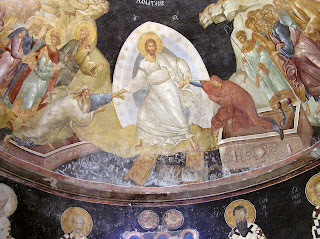The Resurrection Problem
When the wind goes over it, it is gone, and its place shall know it no more" (Ps 103:15-16)
The resurrection has been a problem from the outset. Paul already has to exhort even his Corinthian Christian community, the ones who do believe in Jesus, to belief in his resurrection.
We should be wary however of assuming their skepticism is like that of modern sensibilities. They (and we) are not really arguing about the possibility of the supernatural, or of post-mortem existence.
As to the fact of resurrection, any ancient skepticism was not so much about the theoretical possibility of such a strange thing, but about its desirability . Why want the fragile flesh, prone to decay, revived? Why not seek the freedom of higher things and a purely spiritual existence? As Rowan Williams has observed, for many of the ancients if someone rose from the dead, the “question would have been "How do you get him back into his grave again?"'
For us then the temptation may be to think of the resurrection as an affirmation of post-mortem existence. This however really has little to do with the question; that idea of the ongoing eternal soul stems from a different need or desire. The resurrection does not affirm the eternity of the soul, but the mortality of the embodied self, as the Psalmist acknowledges, yet also the power of God to raise the dead. Paul thus argues (15:13) from the idea of the resurrection to the possibility of Jesus' being raised, not the reverse.
While many of the ancients were repulsed or uninterested in resurrection, there were exceptions. Remember who is writing here in 1 Corinthians; Paul "a Pharisee, son of a Pharisee." The Pharisees affirmed the resurrection; the problem with Jesus' resurrection was not the "what," but the "who" and "when."
The "who" problem is that it is the poor man Jesus who is raised. A messianic king was expected - and of course to us, both are true, but this identification was one of the two most obvious sticking points for those to whom the resurrection itself was a point of faith.
The other problem was the "when." Resurrection was not to be in the now, but the future, when God would renew all things and a new creation would be established. Instead, we have the one man Jesus, seemingly raised out of time.
Paul addresses this, calling Jesus the "first-fruits of those who have died," his resurrection an anticipation of the general resurrection. So the fact that Christ is raised from the dead means that the end has begun; even now, those who are baptized into his death and resurrection are part of a new creation. Our old life is not continued indefinitely, but rather we have received new life.
This is not because we have any property of eternal disembodied existence; we are material beings, who "flourish like a flower of the field." But as the Psalmist goes on to say, "...the merciful goodness of the Lord endures for ever on those who fear him, and his righteousness on children's children." The God who raised Jesus from death will raise us too.
Alleluia. Christ is Risen.
[Sermon from Morning Prayer, St Luke's Chapel, Berkeley Divinity School at Yale, Tuesday of Easter Week 2022].



He is risen indeed! Thank you Andrew. I appreciate your comments and scholarship here.
ReplyDelete